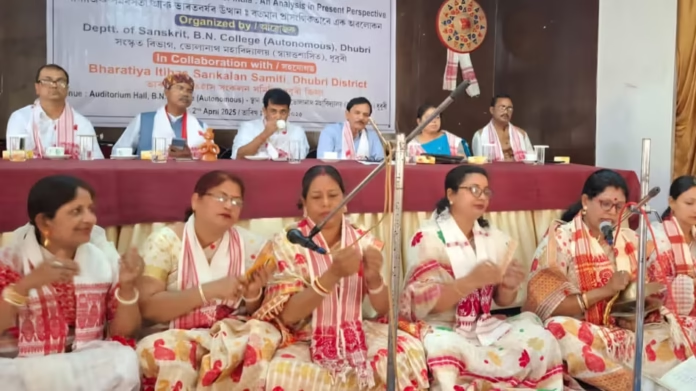Bholanath College hosted a lecture on social integration as part of the Bhaskarabda celebrations, drawing scholars, students, and intellectuals to engage in discussions about India’s unity and progress. The Department of Sanskrit, in collaboration with the Bharatiya Itihas Sankalan Samiti, Dhubri District, organized the event, which explored how historical perspectives can shape contemporary social development.
Scholars emphasized the importance of cultural harmony and inclusivity in fostering national progress. The session highlighted how traditions rooted in ancient Indian philosophy continue to influence modern policies and societal structures. The event also shed light on the relevance of Bhaskarabda, the Assamese calendar system, and its role in preserving regional identity while promoting national unity.
Professor Rajendra Sharma, a historian and keynote speaker, delved into the historical context of social integration in India. He explained that ancient scriptures, including Vedic literature and classical Sanskrit texts, offer insights into harmonious coexistence. He stressed that true integration stems from mutual respect and cultural exchange rather than forced assimilation.
Students actively participated, raising questions about the challenges of maintaining social unity in a rapidly changing world. They discussed issues such as globalization, technological advancements, and ideological divides, all of which impact India’s social fabric. The lecture encouraged them to view integration not just as a historical concept but as an ongoing effort that requires adaptation and conscious engagement.
The organizers ensured that the discussion remained rooted in practical applications. Speakers explored how India’s diverse traditions can coexist within a democratic framework while still upholding constitutional values. They examined case studies of successful social integration models from various regions, showcasing how local customs and national identity can complement one another.
Professor Sharma highlighted how India’s journey toward social integration is intertwined with economic development. He explained that inclusive policies in education, employment, and governance strengthen national unity by ensuring equal opportunities for all. By referencing historical movements such as the Bhakti and Sufi traditions, he illustrated how cultural and religious exchanges have long contributed to India’s pluralistic ethos.
The discussion also touched upon contemporary challenges, including misinformation, communal tensions, and digital polarization. Scholars pointed out that misinformation spreads rapidly in the digital age, often deepening social divides. They stressed the need for critical thinking and historical awareness to counter divisive narratives. By understanding history through a balanced lens, society can prevent misunderstandings and reinforce the spirit of unity.
Students expressed their appreciation for the lecture, noting that it provided a deeper understanding of India’s social fabric beyond textbook knowledge. They recognized the importance of engaging with history in ways that promote constructive dialogue rather than fueling ideological conflicts.
The event concluded with a vote of thanks from the organizers, who reiterated the importance of Bhaskarabda in celebrating Assam’s rich heritage. They emphasized that cultural identity and social cohesion should go hand in hand, ensuring that regional traditions strengthen rather than fragment national unity.
Bholanath College continues to serve as a platform for intellectual discourse, encouraging students to explore complex social issues with an open mind. The lecture on social integration reaffirmed the institution’s commitment to fostering awareness, historical consciousness, and progressive thought among the youth.




